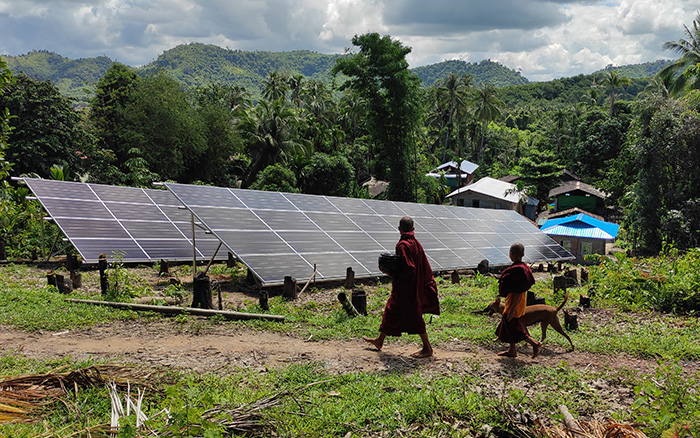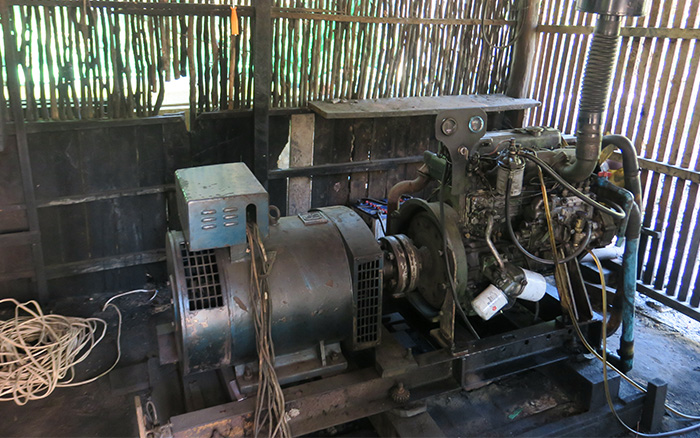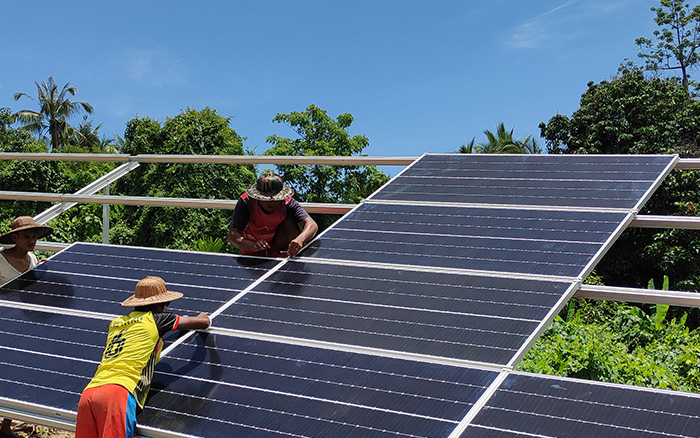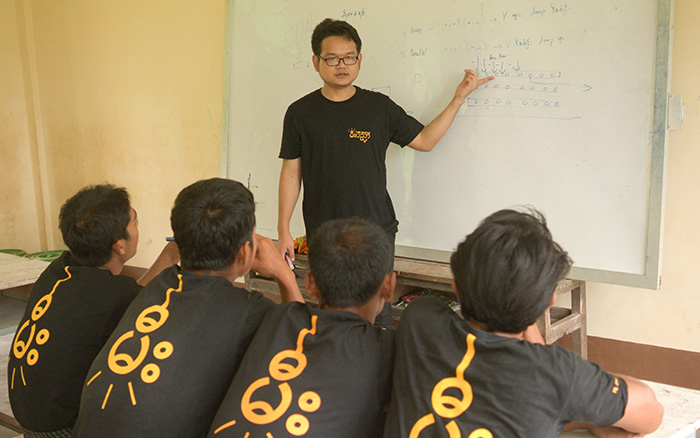Solar Mini-Grids Empower Rural Villages in Myanmar

With the crank of a wrench and a puff of black smoke from his diesel-fueled generator, U Htike Tan Thu would bring the village of Kan Byin in Myanmar to life each evening. For just a few short hours, his community counted on him to deliver much-needed electricity to light their homes, cook their dinner and help their children study. But those precious hours of power came at a high price. Diesel fuel is expensive, and its fumes are harmful to the health of community residents, as well as the environment.
Today, the unhealthy diesel system has been retrofitted with solar energy. U Htike tends to a solar “mini-grid” that produces electricity 24/7 for every family in the Kan Byin community. And U Htike and other local technicians have gained some valuable new skills along the way, learning how to install and maintain a solar mini-grid that will provide reliable, clean energy for the next 25 years, or longer.

SunPower Performance panels power the 42kWp system that is providing the community of Kan Byin in southeast Myanmar with 24/7 access to electricity for the first time.
The system was made possible by Mee Panyar, an innovative organization devoted to expanding energy access and empowering underserved communities. Mee Panyar develops community-centric, sustainable energy infrastructure, supported by local technicians. With a donation of SunPower Performance solar panels facilitated by the GivePower Foundation, Mee Panyar was able to provide the tools and resources to build the solar mini-grid as well as train U Htike and his team to enable long-term, secure job opportunities in operating and maintaining the system.
Global Problem, Local Solution
For many, energy is central to everything we do, and likely something we spend very little time thinking about. We flip a switch and a light comes on, but what if it didn’t? Still today, 940 million people around the world lack access to electricity.1 https://ourworldindata.org/energy-access#access-to-electricity Myanmar in fact, has one of the lowest electrification rates in the world, with approximately 30 million people still without regular access to power.
The situation in Myanmar is just one example of why energy is key to achieving the United Nation’s 2030 Agenda for Sustainable Development—a universal call to action to end poverty, protect the planet and improve the lives and prospects of people everywhere. In 2015, all UN member states adopted 17 Sustainable Development Goals and set out a 15-year plan to achieve those goals.
While Myanmar has many areas of urban development, building a centralized grid that can reach all of its rural communities would take decades by the Myanmar government’s own estimates. Kan Byin, which is more than 100 miles from a grid connection, is just one of 13,000 communities throughout Myanmar where rural do-it-yourself electricians have built diesel-generated systems because there was simply no other alternative. Eleven years ago, U Htike and his wife used their own savings to install Kan Byin’s diesel generator and distribution lines, all without any formal training.

Until recently, this diesel generator was the only source of electricity for the Kan Byin community, providing residents with no more than three hours of electricity each evening.
Project Impacts: Lights, Power and Opportunity
Kan Byin’s new solar mini-grid features 110 SunPower Performance solar panels, state-of-the-art power electronics, as well as a 75 kW battery back-up system to store excess power. SunPower Performance panels were an ideal fit for the project as their innovative shingled cell design eliminates many of the reliability challenges of conventional solar panels. The result is a high-performance, highly reliable panel, engineered to last for decades.
The donation of SunPower Performance panels directly aligns with the mission of Maxeon Solar Technologies—Powering Positive Change™. It’s a powerful mission that resonates even more so with employees, customers and partners when organizations such as Mee Panyar and GivePower are seen making a difference by enabling communities to find their own path to energy self-reliance and sustainable growth.

A local team of installers converts the existing Kan Byin diesel-powered mini-grid to ensure safer and more reliable access to clean energy for the entire community.
For the 248 local families in the Kan Byin community, the solar mini-grid now lights up their homes for their children to study, has improved refrigeration to keep food and medicine fresh, and has lowered their energy costs. Local homes and businesses have seen a 50% decrease in energy costs with the new solar mini-grid, while public facilities receive the electricity for free. In addition, the solar system eliminates the daily use of diesel generation and the harmful emissions that come with it.
After the installation was complete, Mee Panyar and GivePower conducted onsite training with the local operators focused on system maintenance, safety and energy efficiency. Ongoing service of the microgrid will be provided by four members of the local community trained by Mee Panyar, including U Htike Tan Thu.

Mee Panyar delivers safety training to Kan Byin’s team of local service technicians.
This grassroots approach shows the good that can come about when local communities gain the skills and resources to manage and operate their own clean energy: Out of small-scale projects, big opportunities arise.